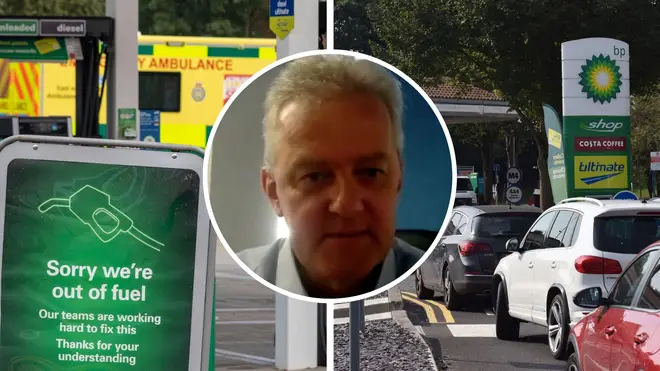
Richard Spurr 1am - 4am
29 September 2021, 19:31

A petrol station allowed NHS workers to jump growing queues for fuel and fill up their tanks, taking priority over other motorists.
The Parkfoot BP garage in West Malling, Kent, focused on people working in the emergency services as a lack of HGV drivers led to shortages at forecourts.
But David Charman, who runs the garage, said the attempt proved too difficult, with motorists trying to claim they were key workers, and with "thousands" arriving, the demand was too great when other stations in the area ran out of fuel.
"It wasn't key workers because key workers would be - I think the majority of Kent considers themselves to be a key worker," he said.
"What we tried to do is prioritise NHS and essential workers, but again that definition is very hard for us to define.
"We had people that work in schools in different capacities and they said, are we an essential worker?
Read more: Motorists with 'petrol rage' will be arrested for fights at filling stations, Khan warns
Read more: How long could it take to fix the UK fuel crisis?

Sadiq Khan warns of consequences of 'petrol rage' amid fuel crisis
"It became impossible for us because there was literally hundreds and hundreds if not thousands and thousands that came into that category and in a situation where we were the only petrol station where we had fuel and therefore we had queues of normal people, if I call them that, then it was incredibly difficult for us to then cope with trying to move people out of a queue on the basis that they were a higher priority than someone else."
Huge queues have become common place as motorists try to fill up their cars, with some even taking jerry cans to stock up on fuel.
Tempers have spilled over into fights at some forecourts.
Parkfoot limited its sales for an hour this week.
But Mr Charman, who saw a queue stretch to a mile-and-a-half on Tuesday, said he would only bring back the prioritisation policy when more fuel is available.
He found it "impossible" to track down essential workers in such a lengthy backlog of cars.
"I think the only time that we will consider doing that is when all the petrol stations around us have fuel and therefore our demand has reduced, then we can say without fear of a huge quantity of people arriving, to try and save an NHS worker from having to get in a queue, we can save then time and energy and get them in and out quickly and to work.
"But it's nearly an impossible task."
He believes he has seen a "slight easing of the situation" because motorists who rushed to fill up in recent days now don't need to.